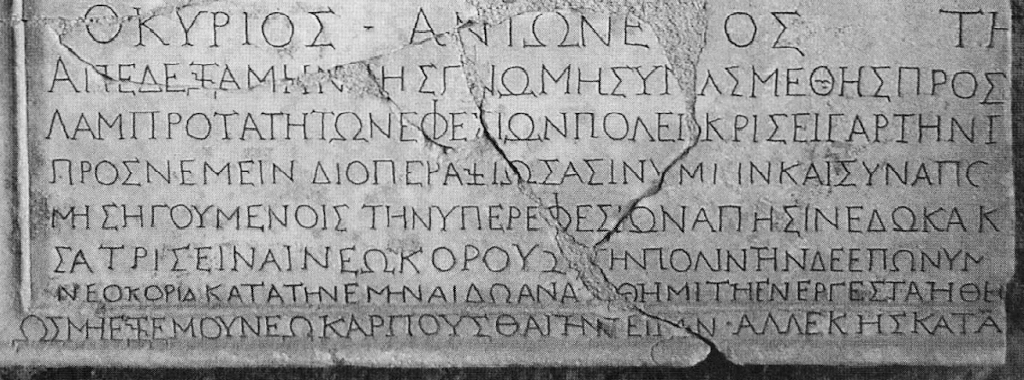Herodianus says that Caracalla suffered from an illness in Asia Minor, as earlier in the Rhine area, and sough treatment in the Asklepieion of Pergamum. Fittingly a (rather damaged) portrait of the Emperor was found in the Asklepieion, and an inscribed base for a statue of the Emperor, dated to 214 AD (EDCS-16100243).
Remains of the Asklepieion of Pergamum.
Photo: Wikimedia, Adam Jones.
Portrait of Caracalla from the Asklepieion.
http://arachne.uni-koeln.de/item/objekt/2023.
Bergama museum. Photos: Inan-Rosenbaum 1966, Pl. 38,1-2.
Coin struck in Pergamum in 214 AD.
Asklepios is seated in a temple, in front of which are Caracalla and a priest with an axe about to sacrifice a bull.
BMC 324. Photos: cgncoins.com.The evidence does not point to a visit of Ephesus by Caracalla, but he may well have been there. He was well aware of the importance of the city. In the Corpus Iuris Civilis we find this instruction by Ulpianus for the proconsul:
Ingressum etiam hoc eum observare oportet, ut per eam partem provinciam ingrediatur, per quam ingredi moris est, et quas Graeci epidymias appellant sive kataploun observare, in quam primum civitatem veniat vel applicet: magni enim facient provinciales servari sibi consuetudinem istam et huiusmodi praerogativas. Quaedam provinciae etiam hoc habent, ut per mare in eam provinciam proconsul veniat, ut Asia, scilicet usque adeo, ut imperator noster Antoninus Augustus ad desideria Asianorum rescripsit proconsuli necessitatem impositam per mare Asiam applicare kai twn mytropolewn Efeson primam attingere. It is proper when he enters the province for him to do so in that portion where this is customary; and that whatever city he reaches first, he should pay attention to what the Greeks call epidymias, that is "the place of sojourn", or kataploun, "the port of arrival"; for the provincials attach great importance to the preservation and observance of this custom and of privileges of this description. There are some provinces to which the Proconsul goes by sea, as, for instance, Asia; and to such an extent was this carried that our Emperor Antoninus Augustus stated in a Rescript, in reply to a request of the Asiatics, "That the Proconsul was absolutely required to proceed to Asia by sea, and to land at Ephesus, before touching at any of the other principal cities". Digesta 1.16.4.5. Translation S.P. Scott. In a letter "to Asia", dated to his sole reign, Caracalla wrote:


The lord Antoninus to Asia. I have welcomed your decision whereby you sided with the brilliant city of the Ephesians, for one must assign the honor with discrimination. Therefore, as you made this request and thought my co-approval was needed, I have given you the decision in favor of the Ephesians, and I have permitted the city to be thrice temple-wardens. But the temple-wardenship of myself [i.e. named after myself] I dedicate in accordance with my reverence to the most active goddess Artemis, so that the honor be enjoyed not from a temple of myself but of her who is divine in every respect. AE 1966, 430; SEG 51.1579. Translation C.P. Jones. Photo: Jones 2017, fig. 1.